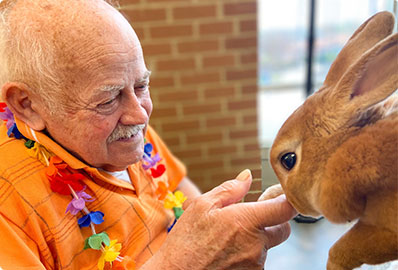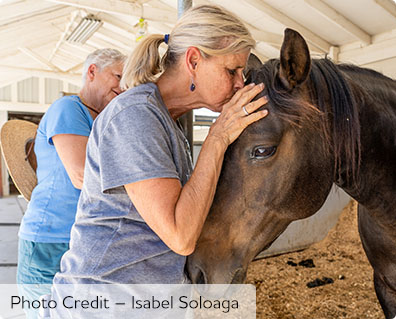
Make 2x the Impact Now
Make 2x the Impact Now
Our March Mission Match is underway, but not for long. Your gift by March 10 can go twice as far to advance research and help provide care and support for those living with Alzheimer’s and their caregivers.
Give NowAnimal therapy helps people navigate dementia
 Bobbie Lytle loved animals her whole life. An elementary school teacher from Maitland, Florida, she was known to bring her dog into the classroom and had an open door policy at home, where she regularly hosted a menagerie of animals. "We grew up with dogs, cats, squirrels or whatever else we rescued," says Bobbie's daughter Tiffany.
Bobbie Lytle loved animals her whole life. An elementary school teacher from Maitland, Florida, she was known to bring her dog into the classroom and had an open door policy at home, where she regularly hosted a menagerie of animals. "We grew up with dogs, cats, squirrels or whatever else we rescued," says Bobbie's daughter Tiffany.
When Bobbie began seeking an age-in-place community, she knew that wherever she chose would have to allow animals. After Bobbie was diagnosed with Alzheimer's six years ago, this requirement gained even more significance, as she wanted animals around her not only for comfort, but also for potential therapeutic benefits. Bobbie eventually moved into Arden Courts of Winter Springs with her dog by her side.
"Having a dog in her lap and a hand in its fur comforted her. It's companionship," says Tiffany.
ProMedica's Arden Courts is a network of 57 memory care communities across the country serving individuals who live with Alzheimer's or another dementia. Nearly all of the communities allow pets and use animal therapy for residents — a program that many assisted living communities around the country have begun to offer. "There's excitement that comes when an animal enters the room," says Terri Lalonde, ProMedica's director of lifestyle programming. "We really encourage all of our locations to have some type of pet therapy on a regular basis."
Animal therapy is an accessible and inexpensive practice that has been shown to provide a wide variety of behavioral and emotional benefits for people living with dementia. The Alzheimer's Association Dementia Care Practice Recommendations — guidelines that set the standard for person-centered quality care — cite several studies that assess the effects of regular engagement with both living and robotic animals. The therapy has been shown to improve mood and facilitate social interaction. It can also have a calming effect that helps with dementia-related behavioral problems, and increase physical activity in people living with dementia.
 "Stroking, walking or simply being near animals stimulates both the mind and body," says Shan'a Mann, executive director of Arden Courts of Winter Springs.
"Stroking, walking or simply being near animals stimulates both the mind and body," says Shan'a Mann, executive director of Arden Courts of Winter Springs.
On a given day, you might find residents at one of Arden Courts' communities surrounding a throng of dogs up for adoption, caring for a brood of freshly hatched chicks or handling rabbits during an education program.
"A lot of our residents grew up either with animals in their households or raised their children with pets in the household, so they still have that desire to be around them as a comfort," Lalonde says.
In between animal therapy programs, Arden Courts of San Antonio has a reserve of robotic dogs and cats available to residents. These pets are responsive to touch, and they bark, purr and nuzzle as a living animal would. The experience can foster a sense of companionship and ease for individuals who may no longer be able to care for a pet independently.
Paula Hertel and Nancy Schier Anzelmo, co-founders of Connected Horse, have seen remarkable outcomes from animal-assisted therapy for people living with dementia and their caregivers. Connected Horse is a therapeutic intervention program that developed as a result of research at Stanford University and the University of California, Davis.
 eople living with memory changes or dementia are invited to enroll in multiday equine-guided workshops with their care partners. Together, the pairs familiarize themselves with the environment, practice grooming and leading horses, and take part in group discussions to reflect on their experiences and receive support from other participants.
eople living with memory changes or dementia are invited to enroll in multiday equine-guided workshops with their care partners. Together, the pairs familiarize themselves with the environment, practice grooming and leading horses, and take part in group discussions to reflect on their experiences and receive support from other participants.
"You have care partners and people with dementia coming to the barn on an equal playing field," Hertel says. "The horse sees them as who they are as individuals, not defined by some role or disease."
Imposing and powerful, horses can be intimidating. Hertel and Schier Anzelmo say they often see dynamics shift as care partners and people with dementia navigate this unfamiliar experience together. "I think there's something about the size and presence of a horse that's very healing. You have to be really present and in the moment," Schier Anzelmo says.
Communicating with a person living with dementia
Alzheimer's and other dementias gradually diminish a person's ability to communicate. Engaging with someone living with Alzheimer's requires patience, understanding and good listening skills.
Participants have found ways to communicate without words and practice mindfulness techniques like acceptance — lessons they then apply to their daily lives.
"Horses teach you that two seemingly different things can both be true. They are big and strong, and can be so gentle, kind and compassionate," Hertel says. "You can be in despair about this awful disease and you can find beautiful moments to be together. It isn't all or none."
Before Bobbie Lytle died in June 2022, Tiffany recalls bringing her own cavalier King Charles spaniel, Tinkerbelle, along on her visits to her mother. As they moved through the building, Tinkerbelle drew admirers and stopped to accept pets and praise, a joy to friends and strangers alike. When Tiffany opened the door to her mother's room, Tinkerbelle ran to Bobbie's side — bringing her happiness, even in the late stages of the disease.
Read More ALZ Magazine Articles


Blog posts
No Time Like the Present

Blog posts
Before the Clock Strikes Midnight

The first survivor of Alzheimer's is out there, but we won't get there without you.
Donate Now
Learn how Alzheimer’s disease affects the brain.
Take the Brain Tour
